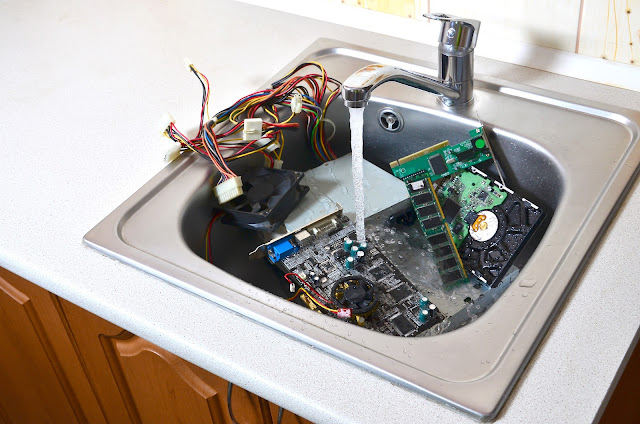Most of us (especially genealogists) probably assume our flash drives (Solid State Drives or SSDs) and hard drives will last forever. Of course, the biggest challenge with flash drives is the loss of the small devices. But as with all electronics, they have both a life expectancy and a technological-obsolescent life-span. By the way, electronics are consumables not durables. Another, by the way, hard drives are at the last stage of their existence due to obsolescence and are being rapidly replaced by SSDs. As of the date of this post, SSDs are still significantly more expensive per unit of storage than hard drives. For comparison, an 8TB (Terabytes or 1000 Gigabytes) Seagate external hard drive is going for about $140 online. However, an 8TB external SSD is in the range of $800 to over $1000.
Even though SSDs are commonly thought to be longer lasting than hard drives because they have no moving parts, actual statistics indicate that we don't yet know how long they will last because the large server farms (data storage facilities) are just now getting enough of the drives to form a real basis for making predictions. The main issue during the ramp up of a new technology is whether to pay the premium price or wait until the new technology is established and the prices come down.
Hard drive technology is well established and there are adequate statistics to determine a good rule of thumb for replacement of about five to six years. Of course, you could just keep using an old hard drive until it died, but if you want to do this, I suggest backing it up either with another newer hard drive or with online storage. The best practice is to have redundant backup capability. I suggest both external hard drives and online storage depending on your pain level if the data on your hard drive was lost.
Ideally, you would have an external hard drive dedicated to backing up your computer's internal drive and then at least two or three other hard drives dedicated to backing up archived files such as scanned documents, scanned photos, digital photos, and any other documents and records that you would like preserved. You start with two or three new drives and then start rotating them with new drives every few years until you get a series of hard drives about two to three years apart in age. Then you begin rotating out the oldest drive as it reaches about five years of age.
As of the date of this post, 16TB and 18TB hard drives are becoming available and the prices are dropping rapidly. Unless you are determined to document every moment of your life with video, it is unlikely that you could ever fill up a 16TB hard drive. My forty years of accumulated computer files are just about 8TBs, but I know that a lot of those files are duplicates.
You also need to realize that your computer has a hard drive and that after about five years, not only will your computer be obsolete, but the hard drive will be ready to die. These facts should clearly demonstrate the need for a redundant backup system. We all think our homes are a safe place until a fire or a tornado or an earthquake or a flood happens in our immediate location and destroys everything in or on our homes. Insurance is great in these situations, but can insurance compensate you for the loss of the information on the drives?
Right now, the possible increase in longevity of flash drives does not warrant the increased cost, but like anything having to do with technology, all that might change tomorrow.





The hard drive in the computer I bought last year crashed a month or so ago. It lasted less than a whole year!
ReplyDeleteThe hard drive in the HP laptop I bought last May failed about 6 weeks ago. I hope my new SSD drive lasts longer!
ReplyDelete